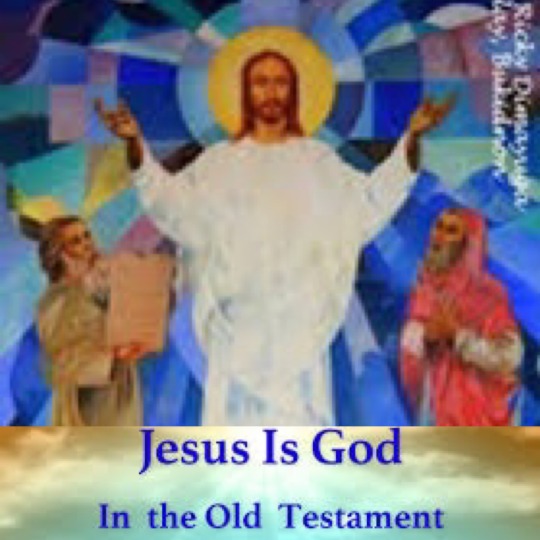#Godmessiah
Text

The God-Messiah of the Old Testament
By Author Eli Kittim 🎓
In the original Hebrew text, Isaiah 9:6 paints a divine picture of the Messiah, unlike the one erroniously drawn by traditional Judaism of a mere human being. In particular, Isaiah 9:6 claims that the “son” (בֵּ֚ן ben) that is given to us is called “mighty” (גִּבּ֔וֹר gibbor) “God” (אֵ֣ל el). This is reminiscent of Leviticus 26:12 in which God **literally** promises to become **incarnated** as a human being:
I will also walk among you and be your
God.
What is more, in Isaiah 9:6 the Messiah is called “the Prince” (שַׂר־ sar), “the everlasting” (Hb. עַד “ad,” derived from “adah,” which means “perpetuity,” “continually,” or “eternally”). In other words, this “son” that “is given” to us is from everlasting❗️As a supplemental observation, compare the similarities of Micah 5:2 (NASB) regarding the Messiah:
His times of coming forth are from long ago,
From the days of eternity.
In other words, he is **uncreated**❗️The Septuagint (LXX), an early Greek translation of the Hebrew Bible, confirms this interpretation by also stating that this upcoming (messianic) ruler is from all **eternity.** In Micah 5:2 of the Septuagint (which is technically Micah 5:1 in the LXX), the prophecy is as follows:
ΚΑΙ σύ, Βηθλεέμ, οἶκος τοῦ ᾿Εφραθά,
ὀλιγοστὸς εἶ τοῦ εἶναι ἐν χιλιάσιν ᾿Ιούδα· ἐκ
σοῦ μοι ἐξελεύσεται τοῦ εἶναι εἰς ἄρχοντα
ἐν τῷ ᾿Ισραήλ, καὶ αἱ ἔξοδοι αὐτοῦ ἀπ᾿
ἀρχῆς ἐξ ἡμερῶν αἰῶνος.
English translation by L.C.L. Brenton:
And thou, Bethleem, house of Ephratha, art
few in number to be [reckoned] among the
thousands of Juda; [yet] out of thee shall
one come forth to me, to be a ruler of Israel;
and his goings forth were from the
beginning, [even] from eternity.
So we have compelling evidence from the very early Septuagint translation that the messiah to come is actually **uncreated,** and that he has existed from all **eternity.** This suggests that the “mighty God” of Isaiah 9:6, “the everlasting,” who is promised to become incarnated in Leviticus 26:12, is the same forthcoming messianic ruler that is mentioned in Micah 5:2 (Micah 5:1 LXX), whose “goings forth were from the beginning, [even] from eternity.”
Conclusion
Keep in mind that all this is coming from the Old Testament. We haven’t even touched the New Testament yet. Nevertheless, we find in the Old Testament numerous references to the messiah as an eternal, mighty, and incarnate God❗️And we haven’t even mentioned the deity of Jesus Christ in the New Testament:
In Jn 1:1 (‘the word was God’); Col. 2:9 (‘in
him the whole fullness of the godhead
[θεότητος] dwells bodily’); Heb. 1:3 (‘The
Son is the radiance of God’s glory and the
exact imprint of his being’); Tit. 2:13 (‘our
great God and Savior Jesus Christ’); ‘being
in very nature God’ (Phil. 2:6); ‘The Son is
the image of the invisible God’ (Col. 1:15);
‘our God and Savior Jesus Christ’ (2 Pet.
1:1); & in Jn 1:3 and Heb. 1:2 Jesus is the
creator and the ‘heir of all things, through
whom he [God] also created the worlds’; Jn
1:3: ‘All things came into being through him
[Jesus], and without him not one thing
came into being.’
Therefore, the eternal, timeless, uncreated, everlasting, almighty God (Rev. 1:8), who has always existed from all eternity, is the very same Creator-God who is promised to be born among us (Isa. 9:6; Mic. 5:2), and to “walk [וְהִתְהַלַּכְתִּי֙] among [בְּת֣וֹכְכֶ֔ם]” us (Lev. 26:12) “and be” our God❗️
The LXX was initially translated back in the 3rd century BC. This is clear evidence from the earliest sources that the messiah would be divine! The Micah 5:2 version of the LXX essentially confirms the DIVINE origin of the prophesied Messiah:
ἀπ᾽ ἀρχῆς ἐξ ἡμερῶν αἰῶνος.
It means that his origins are “from the beginning of days.” In other words, the messiah is the “Ancient of Days” (Aramaic: עַתִּיק יֹומִין, ʿatīq yōmīn; παλαιὸς ἡμερῶν, palaiòs hēmerôn), which is another name for God in Daniel 7:9❗️
#Isaiah9v6#Micah5v2#Leviticus26v12#the little book of revelation#bible study#The_First_Coming_of_Jesus_at_the_End_of_Days#messiah#mighty god#god man#Godincarnate#το_μικρό_βιβλίο_της_αποκάλυψης#bibleexegesis#εκ#lxx#Godmessiah#Biblicaltranslation#Eli_Kittim#LCLBrenton#old testament#septuagint#jesus#Ελικιτίμ#Bible#NewTestamentGreek#ek#the_Jesus_prophecy#Jesus_is_God#the_Great_I_Am#Revelation1v8#christian apologetics
6 notes
·
View notes